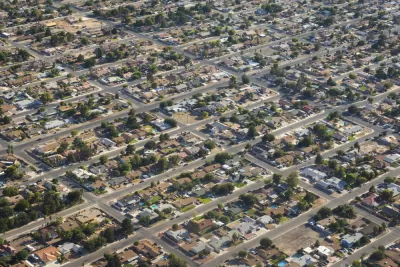In the United States, rates of homeownership among Latino families lag far behind those of white families. A recent article from the Urban Institute digs into the causes and effects of this issue.

Even as the Latino population of the United States grows, their home ownership lags persistently behind whites. In an article on the Urban Institute's website Jim Parrott writes, "According to the American Community Survey, only 45 percent of Hispanic households owned their homes in 2013 compared with 71 percent of whites." Parrot argues that the reasons for this disparity are multiple. One reason is the heads of Latino families are on average younger than the heads of white families and younger people generally have lower credit scores than their older peers. It's difficult to know if there are racial disparities in credit scores because as Parrot explains, "Publicly available numbers for credit scores by ethnicity are difficult to come by, we do know that Hispanic borrowers on average have lower credit scores than do white borrowers"
Still, Parrot argues, credit represents only part of the problem, in his view the main problem is the availability of "good jobs." "The answer is, instead, to increase the number of families who are in the financial position to be homeowners and to ensure that the market effectively serves all who are." A more inclusive economy would go a long way towards alleviating this problem.
Regardless of the cause, the effect of this disparity could be disastrous. "We need to recognize that the face of the nation is changing, and our housing market will inevitably change with it." If Hispanics are left out of home ownership, the housing market could contract significantly. Making the country that much more unequal.
FULL STORY: Why the low Hispanic homeownership rate matters

Alabama: Trump Terminates Settlements for Black Communities Harmed By Raw Sewage
Trump deemed the landmark civil rights agreement “illegal DEI and environmental justice policy.”

Study: Maui’s Plan to Convert Vacation Rentals to Long-Term Housing Could Cause Nearly $1 Billion Economic Loss
The plan would reduce visitor accommodation by 25% resulting in 1,900 jobs lost.

Planetizen Federal Action Tracker
A weekly monitor of how Trump’s orders and actions are impacting planners and planning in America.

Federal Homelessness Agency Places Entire Staff on Leave
The U.S. Interagency Council on Homelessness is the only federal agency dedicated to preventing and ending homelessness.

Restoring Northern India’s Himalayan ‘Water Temples’
Thousands of centuries-old buildings protect the region’s natural springs and serve as community wells and gathering places.

Milwaukee to Double Bike Share Stations
Bublr Bikes, one of the nation’s most successful, will add 500 new e-bikes to its system.
Urban Design for Planners 1: Software Tools
This six-course series explores essential urban design concepts using open source software and equips planners with the tools they need to participate fully in the urban design process.
Planning for Universal Design
Learn the tools for implementing Universal Design in planning regulations.
Caltrans
Smith Gee Studio
Institute for Housing and Urban Development Studies (IHS)
City of Grandview
Harvard GSD Executive Education
Toledo-Lucas County Plan Commissions
Salt Lake City
NYU Wagner Graduate School of Public Service





























